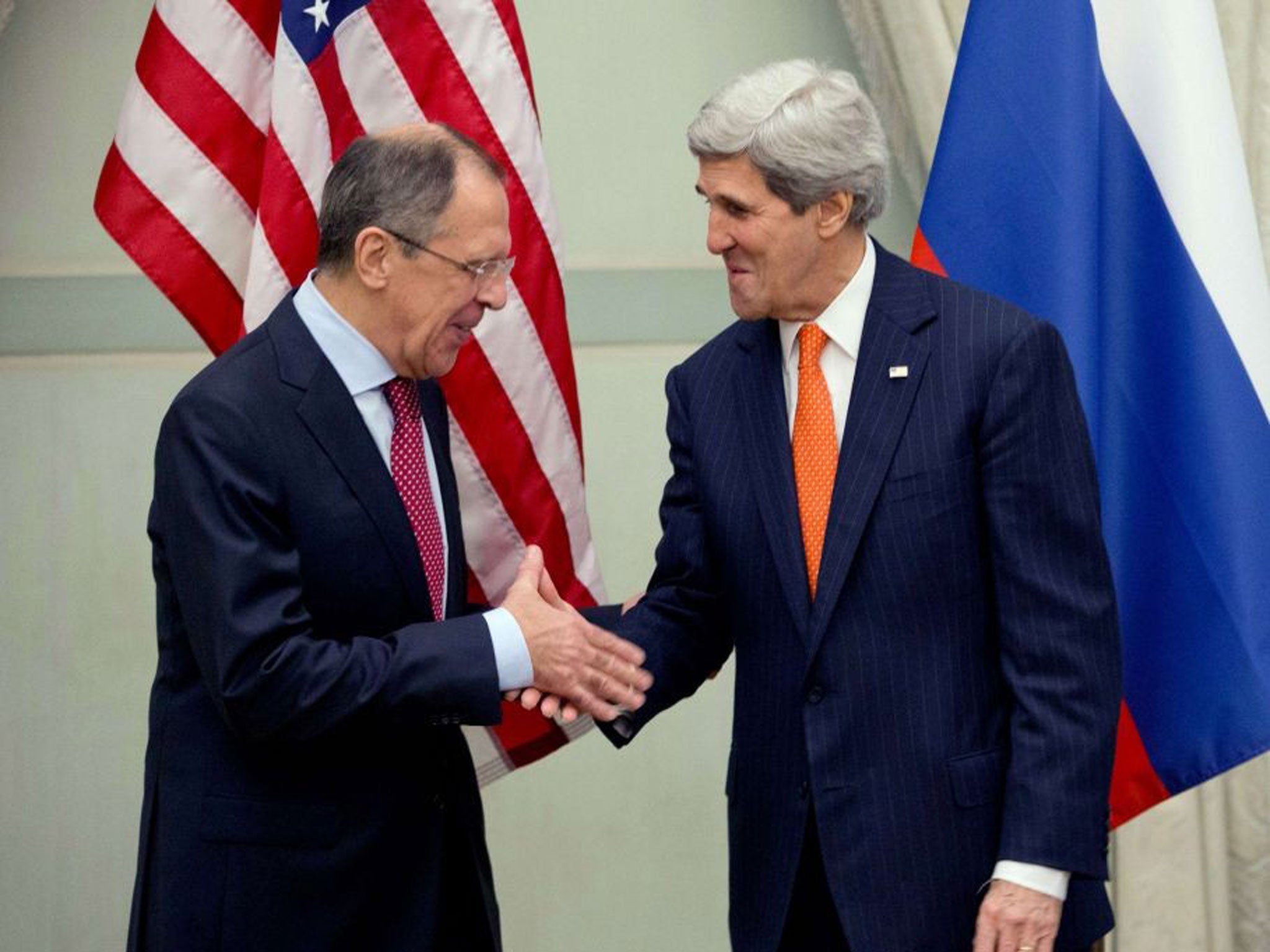Ukraine crisis: US and Russia hold talks as Donetsk tensions rise
The US secretary of state will meet with the Russian foreign minister to discuss easing east-west tensions in Ukraine

The Ukrainian prime minister has said Crimea must remain part of the country, but said the region may be granted more local powers, as the US Secretary of State and the Russian Foreign Minister met to discuss the escalating crisis.
In his first interview since taking office, Prime Minister Arseniy Yatsenyuk said a special task force should be established "to consider what kind of additional autonomy the Crimean Republic could get".
John Kerry is currently in face-to-face talks with Mr Lavrov on easing east-west tensions in the country for the first time since the crisis in Ukraine has escalated.
Earlier today, all foreign ministers for the US, UK and Ukraine agreed talks were crucial to resolving the crisis, along with the deployment of international monitors to Kiev.
In a joint statement, they said: "The United States, United Kingdom and Ukraine agreed that direct talks between Ukraine and Russia, facilitated as needed by members of the international community, are crucial to resolving the current situation
"They also agreed that international observers should be deployed immediately in Ukraine, especially in eastern Ukraine and Crimea."
Meanwhile, some 2,000 pro-Russian protesters have re-occupied a government building in Donetsk, after Ukrainian police reclaimed the building earlier today, the Interfax news agency has reported.
The eastern Ukraine city of Donetsk rejects Kiev’s authority and acted as a political support base of the ousted president Viktor Yanukovych.
The US Defence Secretary Chuck Hagel announced today that it would step up joint aviation training with Polish forces. The Pentagon also is increasing American participation in NATO's air policing mission in its Baltic countries.
Mr Hagel has said he expects to speak with Ukraine's defence minister later today.
Earlier, Mr Hague said he is "not optimistic" that direct talks with Russia will help de-escalate the situation in Ukraine before he met with Mr Lavrov and Mr Kerry.
The British Foreign Secretary said every diplomatic effort would be made to bring the foreign ministers of Russia and Ukraine together later in the day after an international conference on Lebanon.
The US and Britain failed in an attempt to bring Russia and Ukraine together at a meeting today in Paris of a group created to assure Kiev's security after it renounced nuclear weapons in the 1990s.
Mr Hague, Mr Kerry and Ukrainian interim foreign minister Andriy Deshchytsia released a joint statement following the Budapest Memorandum meeting, voicing "deep regret" at Russia's failure to attend.
"Russia has chosen to act unilaterally and militarily. The United Kingdom and United States will continue to support Ukraine's sovereignty and territorial integrity and we commend the new Ukrainian government for not taking actions that might escalate the situation.
"Russia's continued violation of Ukraine's sovereignty and territorial integrity can only degrade Russia's international standing and lead to greater political and economic consequences."
Earlier, Mr Lavrov had said Moscow will do "everything to prevent bloodshed" in Ukraine.
Mr Lavrov repeated the Russian president's claim that they cannot order pro-Russian armed groups in Ukraine's Crimea region to return to their bases because they are "self-defence" forces and do not answer to Moscow during a news conference in Madrid.
Russia has since said it has imposed a ban on the transportation of nuclear fuel across Ukraine, citing the "unstable situation in the country".
In pictures: The crisis in Ukraine
Show all 15Nato and Russia will hold talks in Brussels tomorrow to discuss the stand-off between Ukrainian and Russian soldiers in Crimea and the possibility that Moscow may intervene.
The European Union meanwhile offered Ukraine's new pro-Western government 11 billion euros in financial aid in the next couple of years provided Kiev reaches a deal with the International Monetary Fund.
On Tuesday, the Russian president Vladimir Putin said there was currently no need to send Russian troops into eastern Ukraine, but cautioned Russia would take all measures necessary to protect Ukraine's citizens if they requested help.
The French Foreign Minister Laurent Fabius has warned European Union leaders meeting in Brussels on Thursday could decide on sanctions against Russia if there is no "de-escalation" by that point.
Speaking to France’s BFM TV channel, Mr Fabius said such measures could include restricting visas and individual assets.
During a live press conference yesterday, Mr Putin said Western sanctions under consideration against Russia would be “counter-productive” and would cause “mutual harm.”
Additional reporting by agencies
Subscribe to Independent Premium to bookmark this article
Want to bookmark your favourite articles and stories to read or reference later? Start your Independent Premium subscription today.

Join our commenting forum
Join thought-provoking conversations, follow other Independent readers and see their replies